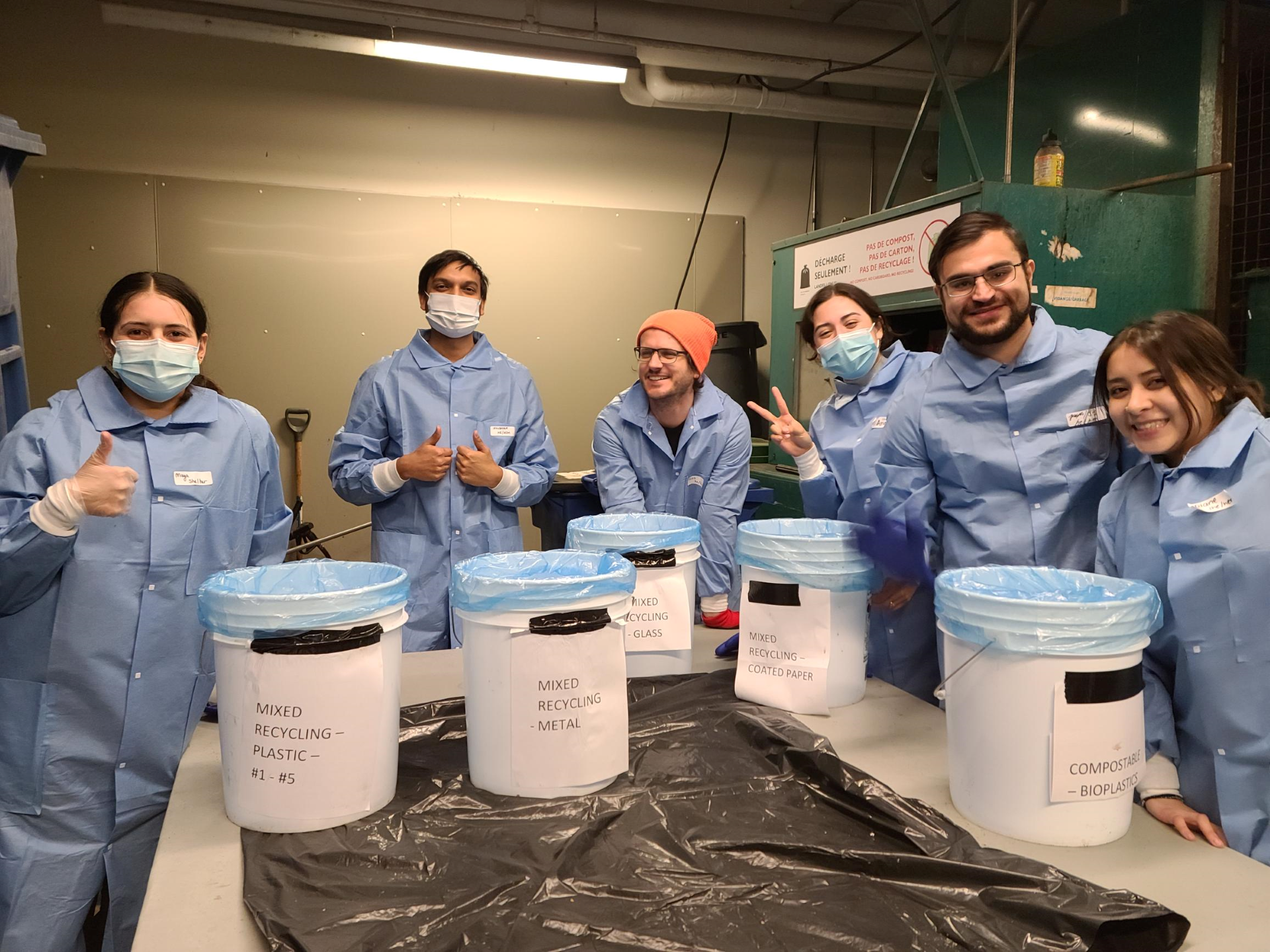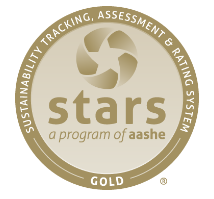Sustainability assessments
In order to understand the scope of sustainability at Concordia and to better implement future sustainable strategies, a sustainability assessment is imperative.

The evolution of Concordia's sustainability efforts
The first sustainability assessment at Concordia was conducted in 2003 through the creation by Sustainable Concordia of the Concordia Campus Sustainability Assessment (CCSA). Between 2003 and 2015, Sustainable Concordia and Concordia University have measured progress and made recommendations towards key sustainability goals.
Since 2012, we have also used STARS to rate our sustainability efforts in the categories of Academics, Engagement, Operations, Planning & Administration, and Innovation.
Since 2017, we have applied regularly for VÉLOSYMPATHIQUE certification, in order to assess how we are doing in relation to services for our cycling community.
In 2020, we applied for the first time to the Times Higher Education (THE) Impact Rankings, which ranks universities on their contributions towards our global progress on the Sustainable Development Goals (SDGs).
In 2020, Concordia also launched its 4th LEED-certified building on campus.
In addition to these formal certifications and rankings, the Office of Sustainability conducts a number of other assessments in order to gauge sustainability progress and to align our efforts accordingly.



CCSA recommendations
The CCSA reports list recommendations for Concordia towards the improvement of the different aspects of sustainability in its community (operations, education, research, well-being, etc.) under four overarching themes:
Theme 1 – Create awareness
In order for sustainability initiatives to reach their full potential, the different facets and linkages of sustainability need to be better understood at Concordia.
Theme 2 – Measure and report
Evaluating the success of sustainability initiatives can only be done through regularly measuring and reporting on the specifics of these initiatives.
Theme 3 – Enhance or create policies, plans, and guidelines
Long-term commitments to sustainability involve ensuring the inclusion of sustainability in the governance structure of the university.
Theme 4 – Specific action items
Sustainable development prepares for the future through better planning but also through direct actions taken to improve the day-to-day well-being of Concordia’s community members.
CCSA reports
The purpose of all of the CCSA reports is to showcase the current sustainability situation of the University and propose recommendations to further sustainability at Concordia. Each version of the report builds in part on the previous one while also including new elements, representing the evolving reality of sustainability at Concordia University.
Interested in an older report? Please email the Office of Sustainability.
The Office of Sustainability disseminated a commuter habits survey of the Concordia community in partnership with the Office of Institutional Planning and Analysis, which elicited participation from more than 2,700 respondents.
Read our reports:
- 2023 Commuter Habits Survey Summary Report
- 2019 Commuter Habits Survey Summary Report
- 2017 Commuter Habits Survey Summary Report
- 2013 Commuter Habits Survey Summary Report
Learn more about sustainable transport at Concordia >
Concordia has quantified and reported its greenhouse gas emissions for the 2010-11, 2014-15, and 2018-19 academic years.
The 2010-11 report was published in 2012 and was intended to pilot the GHG Protocol methodology for Concordia and to better understand where our Scope 1 and 2 emissions are originating from at Concordia. It was included in our 2012 STARS submission.
The 2014-15 report was published in March 2016 by the Office of Environmental Health and Safety and was updated in November 2020 by the Office of Sustainability. The objectives were to create a baseline for the Climate Action Plan, to include (for the first time) emissions from commuting via single-occupant vehicle, and to identify high-impact areas for reducing GHG emissions. It was included in our 2017 STARS submission.
The 2018-19 report was published in August 2023 by the Office of Sustainability. The objectives were to measure progress against the baseline for the Climate Action Plan, to include (for the first time) emissions from public transport in the commuting category, and to capture the GHG emissions for the last complete year before campus closures due to COVID-19. It was included in our 2021 STARS submission.
The 2022-23 report was published in December 2024 by the Office of Sustainability. The objectives were to measure progress against the baseline for the Climate Action Plan, to include (for the first time) emissions from student exchange travel, and to capture the GHG emissions for the first complete year after campus closures ended due to COVID-19. It was included in our 2024 STARS submission.
To obtain LEED (or Leadership in Energy and Environmental Design) certification, Concordia must incorporate a considerable number of features and processes that improve the building’s overall sustainability and environmental impact.
Concordia has four LEED-certified buildings: the John Molson (MB) building at SGW and the PERFORM Centre (PC), Centre for Structural and Functional Genomics (GE), and Applied Science Hub (HU) at the Loyola campus.
The Sustainability Action Plan includes goals and strategies related to five key streams:
- Sustainable Food Systems
- Zero Waste
- Climate Action
- Sustainability in Research
- Sustainability in Curriculum
In collaboration with stream plan coordinators and relevant stakeholders, the Office of Sustainability developed key performance indicators and measurement plans for the stream goals. The progress on the plans is reported to the community in the form of an online dashboard.
In October 2021, Concordia’s Office of Sustainability, jointly with the Office of Institutional Planning and Analysis (OIPA), disseminated the university’s second comprehensive sustainability cultural and literacy assessment (SCLA). The purpose of SCLA is to assess the Concordia community's literacy of sustainability topics as well as to assess sustainability culture on campus.
The objectives of the SCLA were as follows:
- Assess the community’s literacy of sustainability topics and challenges.
- Assess sustainability culture on campus by evaluating sustainabilty values, behaviors, awareness, and beliefs of its community members.
- Assess the influence of sustainability in students’ enrollment decisions.
The results of the survey will serve to help assess the accessibility of and satisfaction with sustainability services on campus, as well as inform future outreach and awareness campaigns. The results of the 2021 SCLA will also serve as a baseline to measure change in literacy and culture at Concordia over time. A post-survey is required under the Association for the Advancement of Sustainability in Higher Education’s (AASHE) Sustainability Tracking, Assessment and Rating System (STARS), version 2.2, and will be administered in 2024.
Read the 2021 Sustainability Culture and Literacy Assessment Report.
The first sustainable curriculum report took place in 2014 in partner with the Sustainable Action Fund's Sustainable Curriculum Project. The aim was to determine what number and level of sustainability courses are available at Concordia across all four faculties and course levels.
The latest sustainable curriculum inventory, conducted by the Office of Sustainability, assesses the level of sustainability content and program-level learning outcomes across the curriculum for the 2018-19 to 2020-21 academic years. The inventory found that 11 percent of courses contain sustainability content. It was also found that approximately 19 percent of Concordia students graduate from programs that require an understanding of the concept of sustainability.
Read the 2021 Sustainable Curriculum Report.
In August 2023, as part of the efforts to continuously improve Concordia’s sustainability curriculum, the Office of the Vice-Provost, Innovation in Teaching & Learning, the Office of Sustainability and the Centre for Teaching and Learning developed a survey to map the university’s sustainability offerings. The survey provided valuable insights into the infusion of sustainability in Concordia’s curriculum, including content on the United Nation’s Sustainable Development Goals and innovative teaching approaches. Read the full report below.
Read the 2024 Mapping Sustainability Curriculum Survey Report.
Introduction to STARS
The Sustainability Tracking, Assessment and Rating System™ (STARS) developed by the Association for the Advancement of Sustainability in Higher Education (AASHE) is a transparent, self-reporting framework to evaluate the sustainability level of different aspects at universities.
As described by AASHE, STARS is designed to:
- Provide a framework for understanding sustainability in all sectors of higher education.
- Enable meaningful comparisons over time and across institutions using a common set of measurements developed with broad participation from the campus sustainability community.
- Create incentives for continual improvement toward sustainability.
- Facilitate information sharing about higher education sustainability practices and performance.
- Build a stronger, more diverse campus sustainability community.
For more information, visit the AASHE STARS' website.
Previous STARS reports
The Times Higher Education (THE) Impact Rankings aim to assess the international higher education sector’s movement toward the United Nations’ 17 Sustainable Development Goals (SDGs). They use carefully calibrated indicators to provide comprehensive and balanced comparisons across three broad areas: research, outreach and stewardship.
In 2023, Concordia ranked in the 101-200 slot among the 1,591 participating institutions.
On individual SDGs, Concordia is among the top 50 in the world in two areas:
- SDG 10 Reduced Inequalities
- SDG 11 Sustainable Cities and Communities
To view our rankings, visit THE's Impact Rankings and search Concordia University by name.
VÉLOSYMPATHIQUE is a certification program offered by Vélo Québec, a non-profit organization that aims to promote the use of bicycles for transportation, recreation and tourism.
The Vélo Québec judges assess the infrastructure, educational initiatives, planning initiatives, and encouragement measures that an organization has put into place to benefit their cycling community before awarding institutions with a bronze, silver, gold, platinum or diamond certification.
In September 2023, Concordia received a VÉLOSYMPATHIQUE Silver rating for our Loyola and downtown campuses.
Read our SGW and Loyola VÉLOSYMPATHIQUE assessment summary (French only).

